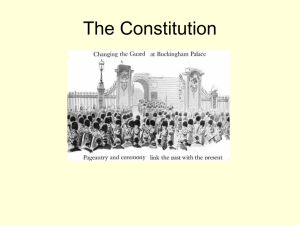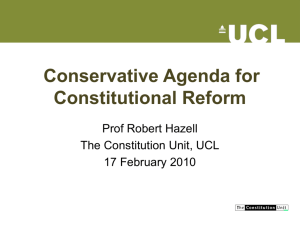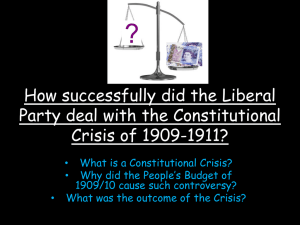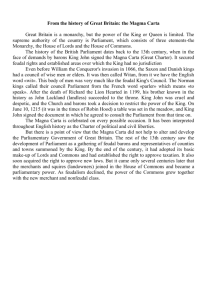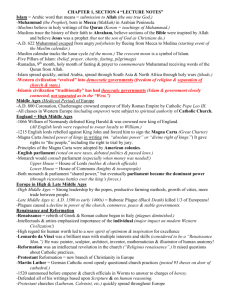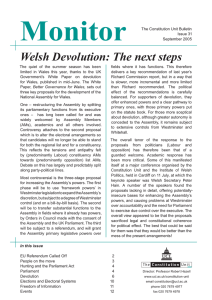Reform of the Constitution
advertisement
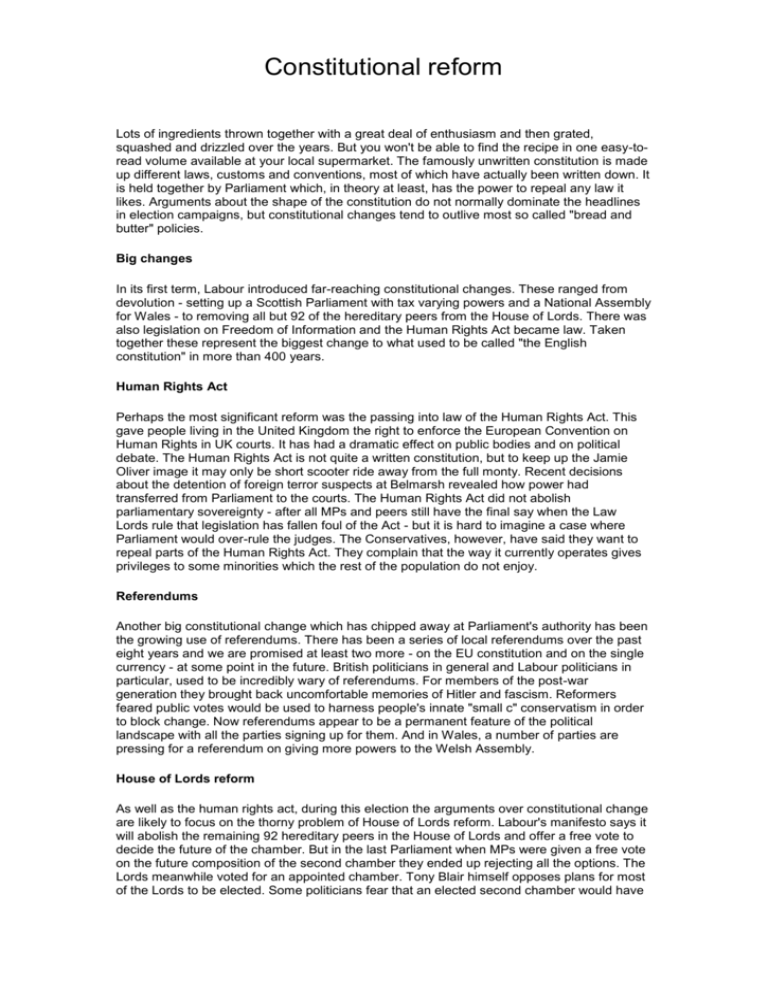
Constitutional reform Lots of ingredients thrown together with a great deal of enthusiasm and then grated, squashed and drizzled over the years. But you won't be able to find the recipe in one easy-toread volume available at your local supermarket. The famously unwritten constitution is made up different laws, customs and conventions, most of which have actually been written down. It is held together by Parliament which, in theory at least, has the power to repeal any law it likes. Arguments about the shape of the constitution do not normally dominate the headlines in election campaigns, but constitutional changes tend to outlive most so called "bread and butter" policies. Big changes In its first term, Labour introduced far-reaching constitutional changes. These ranged from devolution - setting up a Scottish Parliament with tax varying powers and a National Assembly for Wales - to removing all but 92 of the hereditary peers from the House of Lords. There was also legislation on Freedom of Information and the Human Rights Act became law. Taken together these represent the biggest change to what used to be called "the English constitution" in more than 400 years. Human Rights Act Perhaps the most significant reform was the passing into law of the Human Rights Act. This gave people living in the United Kingdom the right to enforce the European Convention on Human Rights in UK courts. It has had a dramatic effect on public bodies and on political debate. The Human Rights Act is not quite a written constitution, but to keep up the Jamie Oliver image it may only be short scooter ride away from the full monty. Recent decisions about the detention of foreign terror suspects at Belmarsh revealed how power had transferred from Parliament to the courts. The Human Rights Act did not abolish parliamentary sovereignty - after all MPs and peers still have the final say when the Law Lords rule that legislation has fallen foul of the Act - but it is hard to imagine a case where Parliament would over-rule the judges. The Conservatives, however, have said they want to repeal parts of the Human Rights Act. They complain that the way it currently operates gives privileges to some minorities which the rest of the population do not enjoy. Referendums Another big constitutional change which has chipped away at Parliament's authority has been the growing use of referendums. There has been a series of local referendums over the past eight years and we are promised at least two more - on the EU constitution and on the single currency - at some point in the future. British politicians in general and Labour politicians in particular, used to be incredibly wary of referendums. For members of the post-war generation they brought back uncomfortable memories of Hitler and fascism. Reformers feared public votes would be used to harness people's innate "small c" conservatism in order to block change. Now referendums appear to be a permanent feature of the political landscape with all the parties signing up for them. And in Wales, a number of parties are pressing for a referendum on giving more powers to the Welsh Assembly. House of Lords reform As well as the human rights act, during this election the arguments over constitutional change are likely to focus on the thorny problem of House of Lords reform. Labour's manifesto says it will abolish the remaining 92 hereditary peers in the House of Lords and offer a free vote to decide the future of the chamber. But in the last Parliament when MPs were given a free vote on the future composition of the second chamber they ended up rejecting all the options. The Lords meanwhile voted for an appointed chamber. Tony Blair himself opposes plans for most of the Lords to be elected. Some politicians fear that an elected second chamber would have greater democratic legitimacy that the present House of Lords and that this would make it even harder for the Government to gets legislation through Parliament. Both of the other main parties would like to see a substantial proportion of peers elected. In the wake of the recent all-night Parliamentary sitting and parliamentary ping-pong on the prevention of terrorism bill, in which the House of Lords played a strong blocking role, Labour also wants to put "reasonable limits" on the time bills spend in the second chamber. Proportional representation The Liberal Democrats have a long track record of promoting constitutional reform. This time round, as well as backing Lords reform, they want a written constitution and a bill of rights. And of course they are promising to change the voting system. For years the Lib Dems have championed the cause of proportional representation, which could increase their number of seats in Parliament.The Labour Government has made some electoral changes. For instance there is a form of PR in the elections for the Scottish Parliament, the Welsh Assembly, the Greater London Assembly and the European Parliament. And the Scottish Executive has decided to introduce PR for local elections in Scotland. The rest of English local government and Westminster still has the first past the post system. The Liberal Democrats have not given up on proportional representation for parliamentary elections and say they would hold a referendum on changing the electoral system. This is the promise Labour made in its 1997 manifesto. After the election the Labour Government set up the Jenkins Commission under the Liberal Democrat peer (and former Labour Cabinet Minister) Lord Jenkins of Hillhead. The Commission suggested introducing a form of PR - called alternative vote plus - for Westminster elections. But its recommendations were never acted upon. Devolution Any decision to give further powers to the Welsh Assembly or Scottish Parliament would have to be taken in Westminster - but there is already discussion of whether to take devolution further in both countries, and calls by some parties for referendums on the issue. The future of the Welsh Assembly is a subject of continuing debate, following the recommendations of the Richard Report. Plaid Cymru and the Liberal Democrats would like more powers for the Welsh Assembly, bringing it closer to the Scottish Parliament, while the Conservatives propose a referendum in which three options, including abolition, would be put. The ruling Welsh Labour party has not yet decided whether it wants expanded powers within the current legal framework, or the power to pass primary legislation; only the latter, it believes, would need a referendum. Labour has pledged in its manifesto that it will "create a stronger Assembly with enhanced legislative powers." In Scotland, the SNP says that if won power in the Scottish Parliament elections in 2007 it would call a referendum on independence. However, the other parties say that the Scottish Executive should be given time to work before making any changes in its powers. Whoever wins the election, MPs, AMs, MSPs and peers alike can expect to find themselves working a few more shifts in the heat of the constitutional kitchen. Story from BBC NEWS: http://news.bbc.co.uk/go/pr/fr/-/1/hi/uk_politics/vote_2005/issues/4372135.stm Event Human Rights Act (1998) Referendums House of Lords Act (1999) PR Devolution Changes Strengths / weaknesses

